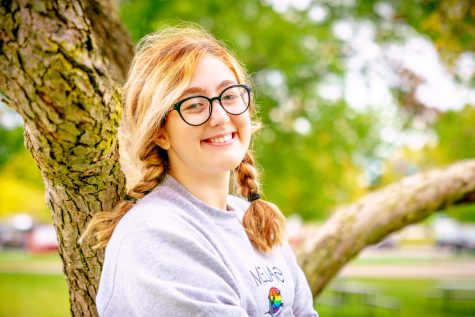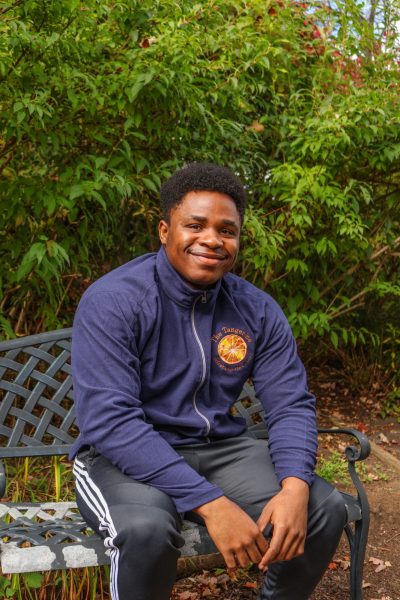Safe Trax closes its doors after three years
The Utica University flag hangs in front of the Frank E. Gannett Memorial Library.
December 9, 2022
A campus wide email sent on Nov. 2 announced that the Safe Trax office will be closing its doors after three years at Utica University and the student body has expressed concerns.
According to Utica’s website, the Safe Trax effort was funded through a $298,330 grant from the Reduce Sexual Assault, Domestic Violence, Dating Violence and Stalking on Campus Program supported by the Department of Justice in 2019.
Jennifer Jones was hired in 2019 as the Safe Trax Director and Ann Locke was brought in as a Safe Trax Advocate and Prevention Specialist during the spring 2022 semester.
“The grant’s three-year term will end at the close of the fall semester, and while that will likely result in some administrative changes, we remain deeply committed to the objectives that prompted the University to pursue this very competitive grant in the first place,” according to the email. “Just to be clear, the completion of this grant will not mean the elimination of any services provided to members of the University community.”
In response to the news, worried students banded together to write a petition in support of Safe Trax, which was spearheaded by senior and health science major Jada LaBounty.
LaBounty, who has worked with Safe Trax, cites that she would not let the office and employees involved go down without a fight.
“[Jen] makes it a safe space where you don’t feel like you’re in a therapy session, you feel like you’re just talking to somebody because that’s what they’re trained in,” LaBounty said.
As of Dec. 9, the petition has received over 400 signatures from the campus community and general public expressing support for Safe Trax.
One of the primary concerns listed on the petition involves the accessibility and number of confidential resources available to students who experience assault in the middle of the night.
According to the Who To Call Where To Go brochure on the Utica website, a confidential resource is unable to disclose any information they receive by law without permission from the student unless there is a threat of imminent danger of harm to themself or another person.
Alternatively, a non-confidential resource is required to report information to certain parties on a “need to know” basis, but cannot offer confidentiality to a victim. The Office of Campus Safety is one of many private, or non-confidential, resources on campus, which also include Title IX Coordinators Lisa Green and David Fontaine.
Safe Trax was listed as an on-call confidential resource that was available to students 24/7. The other confidential resource listed is the Health and Wellness Center counselors, who must be contacted through Campus Safety on weekends and after office hours.
According to Jones, the necessity to report to non-confidential resources is a detriment to students and their comfort on campus.
“As a survivor of violence, having to go to who was a private resource at the time and sharing what I shared and then it had to go to campus safety, it had to go to Title IX, it had to go to conduct,” Jones said. “Being forced into that just because a piece of paper says that I have to wasn’t empowering to me at all. In fact, it made me feel more [like] a victim.”
Another concern listed on the petition is the shift of responsibility from Safe Trax to faculty.
“The school is pushing the responsibility of the program to other faculty that do not have proper training or the time to assist students in a time of need,” the petition said. “Additionally, these newly chosen faculty are not confidential resources, which may deter students from utilizing this support system and finding help.”
Confidential resources cannot be trained overnight and simply appointing someone as a new resource is not sufficient, according to Jones.
“You can’t take a non confidential person and turn them confidential overnight. There are clauses, there’s protection, you have to have policies and, of course, security around documents and things like that,” Jones said. “So it’s not a simple thing where you can just designate someone and that’s your person now. I think as a student, to have these services and then to have them taken away, I would feel betrayal and definitely a loss of trust.”
According to Amy Lindner, the vice president for advancement, Utica achieved the goals of the Safe Trax three-year grant. These goals included building institutional structures to prevent sexual abuse, sexual assault, dating violence and domestic violence; establishing educational programs for students, faculty and staff; and creating a long-term sustainable framework.
“I think this is the first time that we’ve had comprehensive training, training that really makes sure we are using trauma-informed practices, and that’s for student conduct, RAs, campus safety,” Lindner said. “All the training programs we have are train-the-trainer-models. We pay once to get our trainers trained, and then they train students, faculty and staff, so that those education and awareness programs don’t go away.”
Upon arrival at Utica, Kimberly Morton was surprised to learn about the Safe Trax program and thought it was a wonderful program to have here on campus. She is a criminal justice major and a survivor of sexual assault who is working to fix the loopholes in the justice system pertaining to sexual assault cases.
Kimberlee’s Law, which was created by Morton, aims to eliminate the section of the penal code that grants early release to ensure that violent sex offenders serve their full sentence.
In response to the closure of Safe Trax, Morton believes that students will be discouraged from coming forward and willingly sharing their stories.
“I think it’s going to be very difficult,” Morton said. “When a person is sexually assaulted, especially a woman, they’re not going to want to talk to a man or Campus Safety. Are they going to have the same empathy that Jen would have had? It’s going to make [victims] not want to open up and talk about it.”
Lindner cites the Coordinated Community Response Team (CCRT) and programs like the Green Dot Program and 12 Man Program as evidence of the sustainable practices that are now ingrained in Utica’s infrastructure.
Among the student body, many have expressed discomfort with the fact that the current Safe Trax staff will not be kept at Utica because finding someone to confide in and trust is difficult.
“I know people who have experienced trauma and [they are] going to have a hard time opening up to another individual if they were to hire somebody new,” LaBounty said. “And so keeping Jen and Ann as a resource to those who have been using them already will be easier than having to re-tell their story and re-victimize themselves.”
The services provided by Safe Trax will move to the Health and Wellness Center.
According to an email from Ariel Rios sent to The Tangerine, the new executive director of student health and wellness, 24/7 confidential resource access will still be available and specifics on how that will look will be announced soon.
“We are committed to making sure that we continue on with the support that the Safe Trax program provided to the community and are excited about our next steps,” Rios said.
Without the Safe Trax program, the urgency of the administration to keep the program going or proving suitable alternatives to maintain a confidential resource was a concern for many.
“There [was] a lot of resistance and very much focused on the budget. That’s all I can really say about that unfortunately and I think priorities have changed and it’s not going in a direction that I appreciate,” Jones said.






































































































































